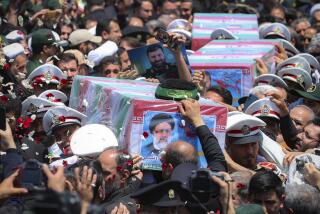Syrian’s Death Spurs Speculation
- Share via
DAMASCUS, Syria — As speculation swirled about the manner of his death, Interior Minister Ghazi Kenaan was buried Thursday in a low-key ceremony for a once-formidable figure in Syria’s security apparatus.
The government insisted Thursday that Kenaan, who served as Syria’s proconsul in Lebanon for 20 years, shot himself the day before. His death rattled a country already under international pressure over its role in Lebanon and perceived inability to control its border with Iraq.
Interior Ministry officials told reporters Thursday in Damascus, the Syrian capital, that Kenaan shot himself in the mouth with a .38-caliber Smith & Wesson revolver while in his office. That account reiterated the report of suicide issued by the official news agency hours after the minister’s death.
Kenaan was alive when he was taken to a hospital, chief public prosecutor Mohammed Louji said, but died soon after.
The minister had faced public allegations of corruption and was questioned last month by a United Nations prosecutor investigating the February assassination of Rafik Hariri, a former Lebanese prime minister.
On Thursday, Foreign Minister Farouk Shareh told reporters outside the hospital that the media had hounded his colleague to death.
“When the media use words, it’s just like using bullets,” said the sullen, shaken-looking diplomat. He alleged that leaks of “unjust and vague information” contributed to the “killing.” Then he quickly corrected himself, saying, “I mean the suicide.”
Shareh stood solemnly with Prime Minister Naji Otari and other ministers in a dark-clad semicircle as Kenaan’s four tearful sons carried their father’s coffin to a waiting ambulance. A convoy of black cars accompanied the ambulance to Bhamra, Kenaan’s hometown in western Syria.
The death occurred before the planned Oct. 25 release of the U.N. report on the slaying of Hariri. The Feb. 14 assassination triggered a political backlash that forced Syrian troops to abandon Lebanon in April, ending 29 years of domination.
As chief of Syria’s military intelligence in Beirut from 1982 to 2002, Kenaan symbolized Damascus’ power over its neighbor. He and his predecessor were among a handful of Syrian officials interviewed three weeks ago by Detlev Mehlis, the German prosecutor heading the U.N. inquiry. Despite speculation that Mehlis will implicate Syrian officials, the prosecutor has said that Kenaan and others were interviewed as witnesses.
About an hour before he died Wednesday, Kenaan went on the Voice of Lebanon radio station to rebuff allegations made by a Lebanese television station that he had been enmeshed in large-scale corruption and bribery during his tenure in the country. He closed the interview by saying, “I think it will be the last statement I make.”
Suspicion persisted Thursday that Kenaan was slain, perhaps to set him up as the main fall guy for Hariri’s killing.
Haithem Maleh, a prominent human rights lawyer and activist, said that he did not interpret Kenaan’s words as evidence of suicidal motivation.
“I don’t think it meant that he would kill himself,” said Maleh, a 74-year-old former judge. “Why not murder? This regime has a history of it. But the question remains, if he killed himself, why did he, and if he was killed, why?
“Ghazi Kenaan was a strong man. He was the emperor of Lebanon,” Maleh added. Syrian state television reported his death “as if just anyone was killed. They didn’t even interrupt their programming or alter it. I think there is something between him and the regime.”
The U.N. had no additional comment Thursday on Kenaan’s death. Mehlis will return to Vienna from Beirut shortly to finish his report, a U.N. spokesman said.
He added that any change in Mehlis’ mission, such as expanding the investigation to include Kenaan’s death, would have to be approved by the U.N. Security Council.
Times staff writer Rotella reported from Paris and special correspondent Abouzeid from Damascus. Staff writer Maggie Farley at the United Nations contributed to this report.
More to Read
Sign up for Essential California
The most important California stories and recommendations in your inbox every morning.
You may occasionally receive promotional content from the Los Angeles Times.













